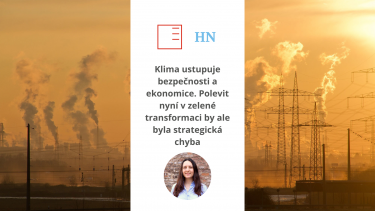WhatNews | Cities are expecting another heat wave this year. What is Prague doing to keep us from getting baked?
The average temperature in the Czech Republic has increased by 2.2 degrees Celsius since the 1960s. As a result of climate change, the country is suffering more frequent weather extremes: torrential rain, drought and heat. Heat waves are particularly severe in heat islands that form in cities. Prague wants to rapidly reduce greenhouse gas emissions, add greenery and water features. Will it be enough? Katarina Svitková, an Associate Research Fellow at EUROPEUM Institute gives examples to WHAT news on how Barcelona is adapting to the heat.
Zjistit více
Hospodářské noviny | Climate is giving way to security and economy. However, easing off on green transformation now would be a strategic mistake
This year's elections to the European Parliament have sparked debates about continuing the European plan to reduce greenhouse gas emissions to net zero by 2050, despite recent events suggesting the need to reassess this plan. The election results did not signify as much of a setback for European green ambitions as anticipated. The priority of climate and environment is no longer as high among most Europeans as it was five years ago, reflecting current political and international challenges such as security, economic prosperity, and the competitiveness of European industry. Kateřina Davidova, a researcher at EUROPEUM Institute, wrote an opinion piece on this topic for Hospodářské noviny.
Zjistit více
BLOG | The pressure for decarbonisation in the Czech Republic is growing. How profitable is wind energy for the Czech Republic?
Coal has been an important part of the Czech economy for decades. As a fossil fuel, however, it is a significant producer of greenhouse gases, especially CO2. Our Research Fellow Jonathan Lyons and Senior Research Fellow Kateřina Davidová write in their blog about the benefits of decarbonisation and switching to wind energy.
Zjistit více
Euractiv | More wind, less coal. What are the benefits of wind energy for the Czech Republic?
Coal has been an important part of the Czech economy for decades. As a fossil fuel, however, it is a significant producer of greenhouse gases, especially CO2. Our Research Fellow Jonathan Lyons and Senior Research Fellow Kateřina Davidová write in their commentary about the benefits of decarbonisation and switching to wind energy.
Zjistit více
BLOG | EU wastes money and food: tackling food waste at EU level
Food waste causes the production of greenhouse gases, wastes water and makes inefficient use of fertile land. In addition to its negative environmental impacts, it is also a social problem. Food is wasted despite the fact that some people are starving. The EU is trying to halve the amount of food waste by 2030 compared to 2015, but current developments suggest that this target will not be achieved. Writes Patricia Vanicka in her blog.
Zjistit víceOp-Ed | Subsidised fossil fuels are a major obstacle to solving the climate crisis. The Czech Republic and the world must confront it
One of the biggest obstacles to solving the climate crisis is fossil fuel subsidies. However, they have not received much attention in the Czech Republic. An Op-Ed on this topic was written by our Senior Research Fellow Kateřina Davidová.
Zjistit více
REPORT | EU-Pacific Talks: In-EV-itable future of automotive industry: what is the role of the Pacific region
In the last debate of the second series of EU-Pacific Talks, organised by EUROPEUM Institute for European Policy, the guests focused on electric and fuel cell vehicles, which are envisaged as a way to decarbonise road transport. Read what our guests discussed in this report by Petra Pospíšilová.
Zjistit víceREPORT | EU-Pacific Talks: In-EV-itable future of automotive industry: what is the role of the Pacific region
V poslední debatě druhé série rozhovorů EU-Pacific Talks, pořádané Institutem pro evropskou politiku EUROPEUM, se hosté zaměřili na elektrická vozidla a vozidla s palivovými články, která se předpokládají jako způsob dekarbonizace silniční dopravy. Přečtěte si o čem naši hosté debatovali v reportu, který napsala Petra Pospíšilová.
Zjistit víceREPORT | EU-Pacific Talks: Be small and beautiful - future of nuclear energy?
This year's third debate in a series of expert discussions on the EU's relations with the Pacific occurred online on Tuesday, 28 March 2023. The guests offered their views on nuclear energy trends, outlook, and small modular reactors' role in energy and industry sectors. Read more about this debate in the report by Petra Pospíšilová.
Zjistit více PDFREPORT | EU-Pacific Talks: Be small and beautiful - future of nuclear energy?
Třetí letošní debata ze série odborných diskusí o vztazích EU s Tichomořím proběhla online v úterý 28. března 2023. Hosté nabídli své názory na trendy v jaderné energetice, výhled a roli malých modulárních reaktorů v energetice a průmyslu. Více o této debatě se dočtete v reportu Petry Pospíšilové.
Zjistit více PDFStaroměstské náměstí 4/1
Praha 1 - Staré Město
110 00
tel.: +420 212 246 552
email: europeum@europeum.org
https://www.europeum.org







